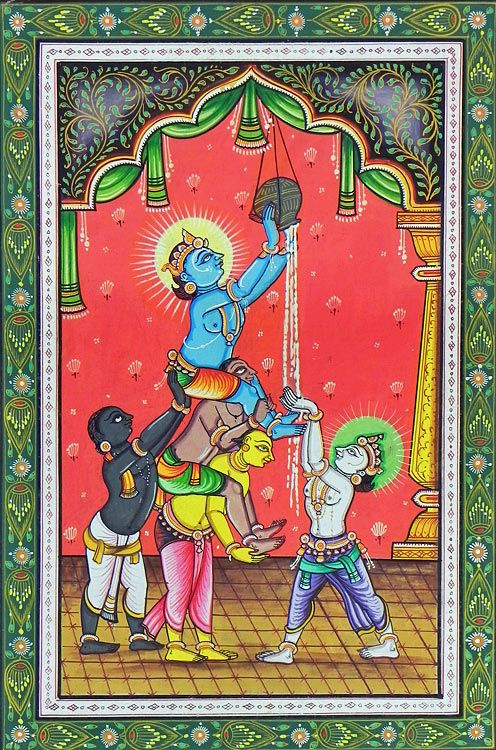ThiruppAvai - Vedam anaithukkum vithu - 11
(திருப்பாவை - வேதம் அனைத்துக்கும் வித்து)
ஒன் சங்கு கதைவாளாழியான்
ஒருவன் அடியேன் உள்ளானே
In ThiruvAimozhi (8-8-1), NammAzwAr after describing Lord NarAyanan’s stunning form as one having four beautiful weapons (sankhu, chakram etc), continues on to say ‘I am His’ (adiyEn) which clearly states the nature of the jeevAtmA. In this posting we will fine tune what we have seen as the characteristics of the JeevAtmA and how it is substantiated by AndAl in Her ThiruppAvai.
‘a, u and ma’ are united in praNavam, the first word in the ashtAksharam (Thirumantram). ‘a’ refers to Lord Vishnu, ‘ma’ refers to the jeevAtmA and the binding ‘u’ refers to the inseparable relationship between the two. Here the jeevAtmA is shown distinct from the ParamAtmA. ParAsara Bhattar in his Astasloki says,
மகாரார்த்தோ ஜீவஸ்ததுபகரணம் வைஷ்ணவமிதம்
The jeevan’s swarUpam is shown as jnAnam and anandham (knowledge and bliss). It is also a seshan (subservient) to Iswaran at all times and places. Jeevan has no independence of its own. He is also atomic in size compared to its Lord who is vibhu (all pervasive and immense).
Let us now see the instances where the the above concepts of the JeevAtmA swarUpam is professed in ThiruppAvai by AndAl.
நமக்கே (verse 1)
நாமும்(verse 2)
நாங்கள் நம் பாவைக்கு (verse 3)
நாங்களும் மார்கழி நீராடி (verse 4)
நாம் தூமலர் தூவி (verse 5)
நாம் சேவித்தால் (verse8)
புண்ணியம் யாம் உடையோம் (verse 28) and many other places.
Let us look at namakkE (நமக்கே) in verse 1 and see how AndAl illustrates some of the characteristics of the JeevAtma that define its nature in this verse. The letter ஏ in நமக்கே demonstrates the jeevAtmA’s incapacity to look after itself.
The 29th verse is the pinnacle of the jeevAtmA swarUpam. The profound doctrines of its nature – ie eternal servitude (ananya seshatvam), incapacity to give anything (akinchanyam), feeling helpless (kArpanyam) and faith that Lord NarAyanan is the savior (ananya saraNatvam) etc are housed in this verse. This verse is so significant for our sampradayam that Parasara Bhattar advised us to recite this verse alone when one is unable to recite the entire ThiruppAvai.
உன் பொற்றாமறை அடியே போற்றும் – ananya bOgyathvam ( His Thiruvadis are parama bhOgyam. pOtrum means without expecting anything in return
நீ குற்றேவல் எங்களை கொள்ளாமல் போகாது – ananya upAyathvam (Lord NarAyanan cannot reject their please as He is the recourse)
உற்றாமே ஆவோம் உனக்கே நாம் ஆட்செய்வோம் ananya seshatvam ( eternal servitude)
Will be continued……..
Azagiya Singer Thiruvadigale Saranam
AndAl Thiruvadigale Saranam
by Smt. Geetha Rangarajan




